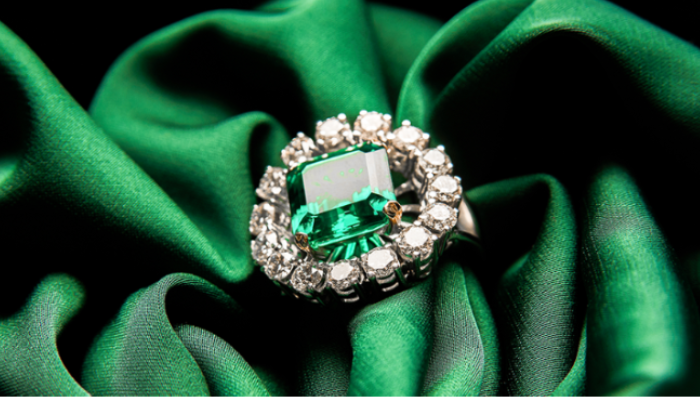
Crafting the perfect piece of bespoke jewellery is an art form, and at its heart lies the crucial decision of choosing the right gemstone. Whether you’re looking to make custom jewellery for a special occasion or simply want to express your unique style, understanding how to select the perfect gemstone is key. This guide will walk you through everything you need to know about choosing gemstones for your bespoke jewellery, helping you create a piece that’s as unique as you are.
Introduction: The Allure of Bespoke Jewellery and Gemstone Selection
There’s something magical about wearing a piece of jewellery that’s been crafted just for you. Bespoke jewellery captures your personal style, tells your story, and often becomes a cherished heirloom. At the core of this personalised art is the gemstone – the sparkling centrepiece that can make or break your custom creation.
When you choose any skilled artisan to make custom jewellery, you’re embarking on a journey of creativity and self-expression. The gemstone you select will be the star of your piece, so it’s worth taking the time to understand what makes a gemstone perfect for you.
In this article, we’ll dive deep into the world of gemstones, exploring everything from basic knowledge to expert tips. By the end, you’ll be equipped with the knowledge to choose the perfect gemstone for your bespoke jewellery, ensuring a piece that’s not just beautiful, but meaningful too.
Understanding Gemstone Basics
Before we delve into the intricacies of selecting the perfect gemstone for your custom jewellery, let’s establish a solid foundation of gemstone knowledge.
What are gemstones?
Gemstones are minerals, rocks, or organic materials that, when cut and polished, are used in jewellery and other decorative items. They’re prized for their beauty, rarity, and durability. Some gemstones, like diamonds, rubies, sapphires, and emeralds, are widely known. Others, like tanzanite or morganite, might be less familiar but equally captivating.
Types of gemstones
Gemstones are typically categorised into two main groups:
- Precious gemstones: This category traditionally includes diamonds, rubies, sapphires, and emeralds. They’re generally rarer and more valuable.
- Semi-precious gemstones: This broader category includes all other gemstones, such as amethyst, topaz, opal, and many more.
“In the world of gemstones, beauty is in the eye of the beholder. A semi-precious stone can be just as valuable to its owner as a precious one.” – The Jewellery Mechanic
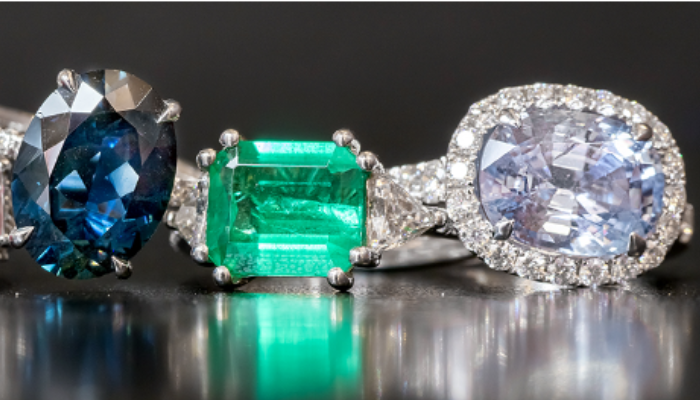
Key factors in gemstone quality: The 4 Cs
When choosing a gemstone for your bespoke jewellery, it’s crucial to understand the 4 Cs: Cut, Colour, Clarity, and Carat. These factors determine a gemstone’s quality and value:
- Cut: This refers to the gemstone’s proportions, symmetry, and polish. A well-cut gemstone reflects light from one facet to another and then back through the top of the stone.
- Colour: In coloured gemstones, more intense and vivid colours are generally more valuable. For diamonds, the less colour, the higher the value (with some exceptions for fancy coloured diamonds).
- Clarity: This measures the small imperfections or inclusions in the gemstone. Fewer inclusions generally mean a more valuable stone.
- Carat: This is the unit of weight for gemstones. Larger stones are typically more valuable, but the other Cs also play a significant role.
Here’s a quick reference table for the 4 Cs:
| Factor | What to Look For |
| Cut | Symmetry, proportion, and how the stone reflects light |
| Colour | Intensity and hue (for coloured stones), lack of colour (for diamonds) |
| Clarity | Fewer inclusions or blemishes |
| Carat | Weight of the stone (1 carat = 0.2 grams) |
Understanding these basics will help you communicate effectively with your jeweller and make informed decisions when choosing a gemstone for your custom piece.
Decoding Gemstone Personalities
Every gemstone has its own unique “personality” – a combination of qualities that make it special. When choosing the perfect gemstone for your bespoke jewellery, consider these aspects:
Birthstones and their significance
Birthstones are gemstones traditionally associated with each month of the year. They’re believed to bring good luck and health to those born in that month. Here’s a quick list:
- January: Garnet
- February: Amethyst
- March: Aquamarine
- April: Diamond
- May: Emerald
- June: Pearl
- July: Ruby
- August: Peridot
- September: Sapphire
- October: Opal
- November: Topaz
- December: Turquoise
Choosing your birthstone for your custom jewellery can add a personal touch and symbolic meaning to your piece.
Colour psychology in gemstone selection
Colours can evoke emotions and convey messages. When you make custom jewellery, consider the psychological impact of your chosen gemstone’s colour:
- Red (Ruby, Garnet): Passion, energy, strength
- Blue (Sapphire, Aquamarine): Calm, trust, intelligence
- Green (Emerald, Peridot): Growth, harmony, freshness
- Yellow (Citrine, Yellow Sapphire): Happiness, optimism, clarity
- Purple (Amethyst): Royalty, mystery, spirituality
- Pink (Rose Quartz, Morganite): Love, femininity, compassion
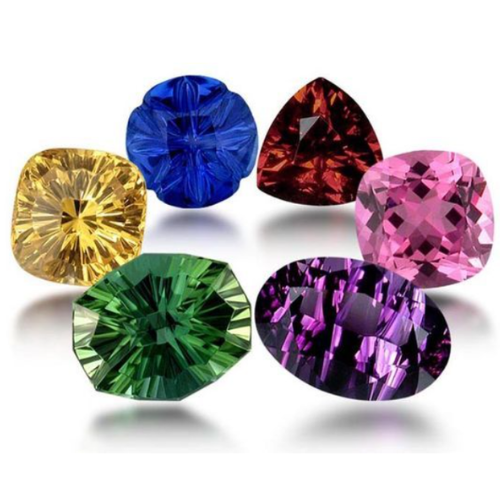
Matching gemstones to personal style and wardrobe
When choosing a gemstone for bespoke jewellery, consider your personal style and wardrobe. A bold, statement gemstone might be perfect for someone with a dramatic fashion sense, while a more subtle stone could suit a minimalist style.
Consider:
- Your typical colour palette
- The occasions you’ll wear the jewellery
- Your other jewellery pieces
Remember, the goal is to choose a gemstone that resonates with you and complements your style, making your custom piece a true reflection of your personality.
Factors to Consider When Choosing a Gemstone for Custom Jewellery
Selecting the perfect gemstone for your bespoke jewellery involves more than just picking your favourite colour. Here are some crucial factors to keep in mind:
Budget considerations
Gemstone prices can vary widely, from a few dollars to millions per carat. When you make custom jewellery, it’s important to have a realistic budget in mind. Remember, the cost isn’t just about the gemstone – it also includes the setting, design work, and craftsmanship.
“A beautiful piece of bespoke jewellery doesn’t have to break the bank. There are stunning gemstones at every price point.” – The Jewellery Mechanic
Durability and hardness (Mohs scale)
The Mohs scale of mineral hardness ranges from 1 (softest) to 10 (hardest). For jewellery that will be worn daily, like engagement rings, consider gemstones with a hardness of 7 or above to resist scratches and wear.
Here’s a quick reference for popular gemstones and their Mohs hardness:
| Gemstone | Mohs Hardness |
| Diamond | 10 |
| Ruby | 9 |
| Sapphire | 9 |
| Topaz | 8 |
| Emerald | 7.5-8 |
| Amethyst | 7 |
| Opal | 5.5-6.5 |
| Pearl | 2.5-4.5 |
Intended use of the jewellery
Consider how often and where you’ll wear your custom piece. A delicate opal might be perfect for occasional wear, but may not withstand the rigours of daily use. On the other hand, a diamond or sapphire could be ideal for everyday jewellery.
Skin tone and gemstone complementarity
Your skin tone can influence how a gemstone looks when you wear it. Generally:
- Cool skin tones (pink, olive, or blue undertones) pair well with blue, purple, and green gemstones.
- Warm skin tones (yellow, golden, or peach undertones) complement red, orange, and yellow gemstones.
- Neutral skin tones can wear virtually any colour gemstone beautifully.
Personal meaning and symbolism
Many gemstones have traditional meanings or properties associated with them. For instance:
- Diamonds symbolise eternal love
- Rubies represent passion and vitality
- Sapphires are associated with wisdom and loyalty
- Emeralds symbolise growth and harmony
Choosing a gemstone with a meaning that resonates with you can add an extra layer of significance to your bespoke jewellery.
Popular Gemstones for Bespoke Jewellery
When you choose to make custom jewellery, you have a world of gemstones at your fingertips. Here are some popular choices and their unique characteristics:
Diamonds: The classic choice
Diamonds have long been a favourite for bespoke jewellery, especially for engagement rings. They’re prized for their brilliance, durability, and symbolic meaning of eternal love.
Pros:
- Extremely durable (10 on Mohs scale)
- Brilliant sparkle
- Versatile – available in various colours
- Retains value well
Cons:
- Can be expensive
- Ethical concerns with some sources (look for conflict-free or lab-grown diamonds)
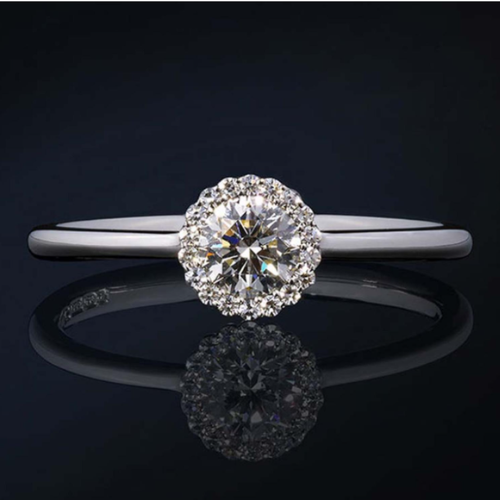
Coloured gems: Rubies, sapphires, and emeralds
These three gemstones, along with diamonds, are considered the four precious gems.
Rubies:
- Rich red colour symbolising passion and vitality
- Very durable (9 on Mohs scale)
- Rare in large sizes, which can increase value
Sapphires:
- Best known for blue varieties, but come in many colours
- Very durable (9 on Mohs scale)
- Often used as a more affordable alternative to diamonds in engagement rings
Emeralds:
- Prized for their lush green colour
- Associated with growth and prosperity
- Often have inclusions, which are considered part of the stone’s character
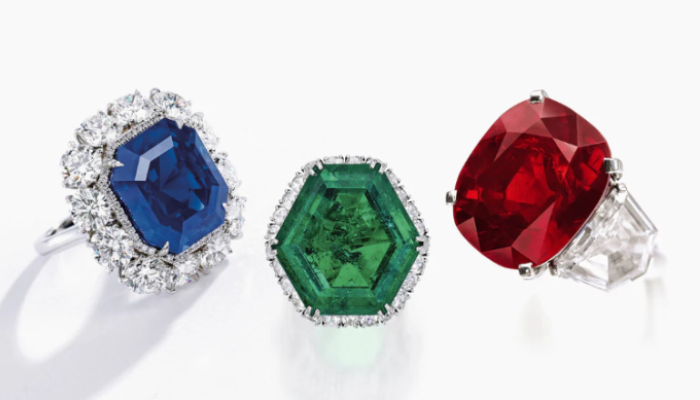
Unique options: Tanzanite, opal, and morganite
For those looking for something different in their bespoke jewellery, consider these unique gemstones:
Tanzanite:
- Beautiful blue-violet colour
- Rare – only found in one location in Tanzania
- Relatively soft (6.5-7 on Mohs scale), requiring careful wear
Opal:
- Known for its play-of-colour, displaying various colours as it moves
- Each stone is unique
- Requires special care due to its softness (5.5-6.5 on Mohs scale)
Morganite:
- Soft pink to orange-pink colour
- Growing in popularity for engagement rings
- More affordable than diamonds of similar size
When you choose The Jewellery Mechanic to create your custom piece, they can guide you through the pros and cons of each gemstone type, helping you select the perfect stone for your unique design.
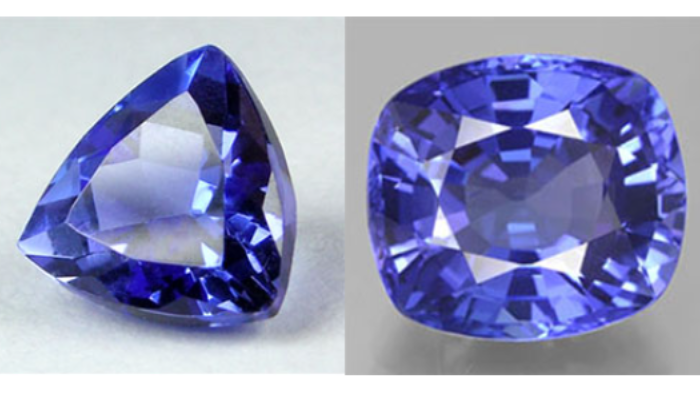
Navigating Gemstone Treatments and Enhancements
In the world of bespoke jewellery, it’s important to understand that many gemstones undergo treatments or enhancements to improve their appearance or durability. Here’s what you need to know:
Common treatments
- Heat treatment: Used to enhance colour or clarity in sapphires, rubies, and other gemstones.
- Irradiation: Can change a gemstone’s colour, often used on diamonds and topaz.
- Fracture filling: Fills cracks in gemstones to improve appearance and durability.
- Oil or resin treatment: Commonly used on emeralds to fill surface-reaching fissures.
“Transparency is key when it comes to gemstone treatments. Always ask your jeweller about any treatments a stone has undergone.” – The Jewellery Mechanic
Natural vs. lab-created gemstones
When you make custom jewellery, you might consider lab-created gemstones:
Natural gemstones:
- Formed in nature over millions of years
- Each stone is unique
- Generally cost more
- Can have ethical sourcing concerns
Lab-created gemstones:
- Chemically identical to natural stones
- More affordable
- Consistent quality
- Environmentally friendly and ethically sourced
Ethical considerations in gemstone sourcing
As consumers become more conscious of ethical issues in the jewellery industry, many are seeking ethically sourced gemstones for their bespoke jewellery. Consider:
- Fair trade gemstones: Ensure fair wages and safe working conditions for miners.
- Conflict-free diamonds: Certified to be free from association with violent conflict.
- Recycled metals: Using recycled gold or platinum can reduce environmental impact.
Your jeweller should be able to provide information about the sourcing of their gemstones and metals.
Working with a Jeweller to Select Your Perfect Gemstone
Collaborating with a skilled jeweller is crucial when creating bespoke jewellery. Here’s how to make the most of this partnership:
Questions to ask your jeweller
- What is the gemstone’s origin?
- Has the stone undergone any treatments?
- Can you explain the 4 Cs for this specific stone?
- What are the care requirements for this gemstone?
- Do you provide a certificate of authenticity?
- What’s your policy on returns or adjustments?
The importance of certifications
For valuable gemstones, especially diamonds, a certificate from a reputable gemmological laboratory is crucial. This document provides an unbiased assessment of the stone’s characteristics. Look for certifications from:
- Gemmological Institute of America (GIA)
- International Gemological Institute (IGI)
Custom cutting options
When you make custom jewellery, you might consider having your gemstone custom cut. This can:
- Maximise the stone’s beauty
- Create a unique shape or style
- Potentially improve the stone’s brilliance
However, custom cutting can be more expensive and may result in more weight loss from the rough stone.
Caring for Your Bespoke Gemstone Jewellery
Once you’ve chosen the perfect gemstone and created your custom piece, proper care will ensure it remains beautiful for years to come.
Cleaning and maintenance tips
- Clean your jewellery regularly with a soft brush and mild soap solution
- Avoid harsh chemicals, including chlorine
- Remove jewellery before physical activities or housework
- Have your pieces professionally cleaned and checked annually
Storage recommendations
- Store each piece separately to avoid scratches
- Use soft cloth pouches or lined jewellery boxes
- Keep opals and pearls in slightly humid environments to prevent cracking
Insurance considerations
For valuable bespoke jewellery, consider specialised jewellery insurance. This can protect your investment against loss, theft, or damage.
Gemstone Myths Debunked
As you explore the world of gemstones for your custom jewellery, you might encounter some myths. Let’s set the record straight:
- Myth: Diamonds are the hardest substance on Earth.
Fact: While diamonds are extremely hard, there are a few substances harder, like wurtzite boron nitride.
- Myth: All emeralds are green.
Fact: While most emeralds are green, they can range from yellow-green to blue-green.
- Myth: Opals are bad luck.
Fact: This superstition has no basis in fact. Opals are beautiful gemstones that can bring joy to their wearers.
- Myth: You can’t wear pearls every day.
Fact: With proper care, pearls can be worn daily. Just remember they’re softer than other gemstones.
- Myth: Lab-created gemstones are fake.
Fact: Lab-created gemstones have the same chemical and physical properties as natural ones – they’re just created in a different environment.
Trends in Bespoke Gemstone Jewellery
Staying informed about current trends can help inspire your custom jewellery design. Here are some current popular choices and emerging favourites:
Current popular choices
- Coloured gemstones for engagement rings: Sapphires, rubies, and emeralds are gaining popularity as alternatives to traditional diamonds.
- Vintage-inspired designs: Art Deco and Victorian-style pieces featuring unique gemstone cuts are trending.
- Sustainable and ethical gems: There’s increasing demand for responsibly sourced and lab-created gemstones.
Emerging gemstone favourites
- Morganite: This peachy-pink stone is becoming a favourite for engagement rings.
- Alexandrite: Known for its colour-changing properties, this rare gemstone is gaining attention.
- Salt and pepper diamonds: These speckled diamonds offer a unique, organic look.
Mixing and matching gemstones
A growing trend in bespoke jewellery is the combination of different gemstones in a single piece. This approach allows for:
- Unique colour combinations
- Personalised symbolism (e.g., combining birthstones of loved ones)
- Interesting texture and depth in the design
When you choose The Jewellery Mechanic to create your custom piece, they can help you explore innovative ways to mix and match gemstones for a truly one-of-a-kind creation.
Investment Value of Gemstones in Custom Jewellery
While the primary purpose of bespoke jewellery is personal enjoyment, it’s worth considering the potential investment value of your chosen gemstones.
Factors affecting gemstone value over time
- Rarity: Gemstones found in limited quantities typically hold their value well.
- Durability: Harder stones are less likely to be damaged, maintaining their value.
- Market demand: Popularity can fluctuate, affecting prices.
- Colour and quality: Exceptional specimens in desirable colours tend to appreciate more.
- Size: Larger stones of high quality are often rarer and more valuable.
Collectible and rare gemstones
Some gemstones are particularly prized by collectors, which can increase their value:
- Paraiba Tourmaline: Known for its neon blue-green colour
- Red Beryl: Extremely rare, found only in a few locations
- Benitoite: A rare blue gemstone found almost exclusively in California
- Alexandrite: Valued for its colour-changing properties
“While investment potential can be a factor, the true value of bespoke jewellery lies in its personal meaning and the joy it brings you.” – The Jewellery Mechanic
Case Studies: Real-Life Examples of Perfect Gemstone Choices
Let’s look at some success stories from custom jewellery owners who chose the perfect gemstones for their bespoke pieces:
Case Study 1: Sarah’s Sapphire Engagement Ring
Before: Sarah wanted a unique engagement ring that reflected her love of the ocean.
After: Working with The Jewellery Mechanic, Sarah chose a stunning blue sapphire surrounded by small diamonds in a wave-like setting. The sapphire’s durability makes it perfect for daily wear, while its rich blue colour reminds Sarah of the sea she loves.
Case Study 2: Tom’s Family Heirloom Redesign
Before: Tom inherited an outdated brooch featuring several small gemstones.
After: Tom decided to make custom jewellery using the inherited stones. Jewellers at The Jewellery Mechanic helped him create a modern pendant, combining the original rubies and diamonds with new complementary gemstones. The result was a meaningful piece that honoured family history while suiting Tom’s contemporary style.
Case Study 3: Lisa’s Birthstone Collection
Before: Lisa wanted a unique way to represent her family in her jewellery.
After: The Jewellery Mechanic helped Lisa design a custom bracelet featuring the birthstones of each family member. The varied colours of garnet, amethyst, emerald, and topaz created a vibrant, personalised piece that Lisa cherishes.
These case studies demonstrate how choosing the right gemstones can transform bespoke jewellery into deeply meaningful, personalised creations.
Conclusion: Crafting Your Unique Gemstone Story
Choosing the perfect gemstone for your bespoke jewellery is a journey of discovery – about the fascinating world of gems, but also about your own tastes, values, and style. Whether you’re drawn to the classic brilliance of a diamond, the rich hues of coloured gemstones, or the unique character of rarer stones, your choice will be a reflection of you.
Remember these key points as you embark on your gemstone selection adventure:
- Understand the basics of gemstone quality and the 4 Cs.
- Consider the gemstone’s durability for your intended use.
- Think about the symbolism and personal meaning behind different gems.
- Don’t hesitate to explore unique or lesser-known gemstones.
- Work closely with a skilled jeweller like The Jewellery Mechanic to bring your vision to life.
- Consider ethical sourcing and sustainability in your choices.
- Care for your gemstone properly to ensure its long-lasting beauty.
When you make custom jewellery, you’re not just creating an accessory – you’re crafting a story, a memory, a piece of yourself to wear and cherish. The gemstone you choose will be at the heart of this story, so take your time, do your research, and most importantly, choose something that resonates with you.
Whether you’re designing an engagement ring, reimagining a family heirloom, or simply treating yourself to a special piece, the perfect gemstone is out there waiting for you. With the knowledge you’ve gained from this guide and the expertise of a skilled jeweller, you’re well-equipped to find it and create a piece of bespoke jewellery that’s uniquely, beautifully yours.
FAQs About Choosing Gemstones for Custom Jewellery
- How do I know if a gemstone is high quality?
Look at the 4 Cs: Cut, Colour, Clarity, and Carat. A high-quality gemstone will have a good balance of these factors. Always ask for certification from a reputable gemmological lab for valuable stones.
- Can I use my own gemstone in a custom piece?
Absolutely! Many jewellers, including The Jewellery Mechanic, are happy to work with gemstones you provide. They can assess the stone and advise on the best design options.
- What’s the most durable gemstone for everyday wear?
Diamond is the hardest gemstone, followed closely by ruby and sapphire. These are excellent choices for jewellery you plan to wear daily.
- How do I care for softer gemstones?
Store them separately to avoid scratches, clean them gently with mild soap and water, and remove them before physical activities. Consider having a protective setting designed for more delicate stones.
- Are there any gemstones I should avoid?
There aren’t necessarily gemstones to avoid, but some require more care than others. Soft stones like opal or pearl, or stones with perfect cleavage like kunzite, need extra care in both setting design and daily wear.
Remember, when you choose The Jewellery Mechanic to make custom jewellery, they can provide expert advice on gemstone selection and care tailored to your specific needs and desires.
